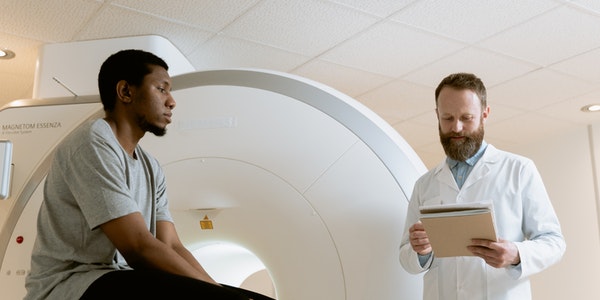Keeping fit and healthy helps us to be better versions of ourselves. While getting good sleep, a healthy diet and regular exercise are part of maintaining good health, we usually tend to overlook another important aspect of wellbeing – health tests.
Even if you are in good health, it is still important to get regular health check-ups and tests to ensure all is well. There are some health checks and tests that are specific to men and are necessary for detecting for any health issues that may be present, but do not have any noticeable symptoms.
Prostate Cancer Screening
One of the most essential health tests men should get is screening for prostate cancer – one of the most prevalent forms of cancer in India. The prostate gland is a small gland located below the bladder in males. Prostate-specific antigen (PSA) is a protein produced by cancerous and noncancerous tissue in the prostate gland. It is usually found in semen, which is also produced in the prostate. Small amounts of prostate-specific antigen also circulate in the blood.
Prostate-specific antigen tests screen for prostate cancer by measuring the amount of prostate-specific antigen present in the blood. Although high levels of PSA can be an indication of prostate cancer, elevated PSA levels could also point to other non-cancerous conditions such as an enlarged or inflamed prostate.
Men over 55 years of age, especially those with a family history of prostate cancer should consider getting a PSA test done.
Testicular Cancer Screening
Another type of cancer which is prevalent in men is testicular cancer. Testicular cancer occurs in the testicles which are located in the scrotum. While testicular cancer is relatively rare compared to other cancers; it is highly treatable especially when detected early.
Although there are no standard screenings for testicular cancer, regular self-examination and routine doctor check-ups can help to detect it early.
Some of the symptoms of testicular cancer include:
- Swelling, enlargement or lump in either testicle
- Feeling of heaviness in the scrotum
- Pain or discomfort in testicle or scrotum
- Dull ache or pain in abdomen or groin
- Tenderness or enlargement of breast tissue
- Back pain
Testicular cancer is most prevalent in men between the ages of 15 and 35. Regular screening is recommended for those who have a family history of testicular cancer.
Colorectal Cancer Screening
Colorectal cancer is one of the most prevalent cancers in both men and women, therefore, it is important to get regular colorectal cancer screenings. Colorectal cancer screenings are usually divided into screening for cancer and screening for polyps (clump of cells on the lining of the colon) which can lead to cancer.
There are various types of colorectal cancer screenings such as:
- Colonoscopy – during this procedure, the doctor uses a flexible tube with a small camera to examine the inside of the colon and rectum for polyps or other abnormal tissue. During the procedure, polyps and other abnormal tissue can be removed through a scope if needed and a biopsy (tissue sample) can be taken as well.
- Flexible Sigmoidoscopy – this procedure is used to examine the colon (lower section of the large intestine). During this procedure, a thin, flexible tube is inserted into the rectum; a small camera on the tip of the tube allows the doctor to see inside the rectum, the sigmoid colon and the descending colon. Polyps and other abnormal tissue can be removed, and biopsies can also be taken during the procedure. Nevertheless, flexible sigmoidoscopy does not allow your doctor to see the entire colon. Therefore, this procedure alone cannot detect cancer or polyps that may lead to cancer.
- Fecal Tests – Tests such as guaiac-based fecal occult blood test (gFOBT) and the fecal immunochemical test (FIT), detect small amounts of blood in stool. This is because colorectal cancers may sometimes bleed. For this procedure, a stool sample is collected and sent to a laboratory for examination. Similarly, a stool DNA test checks for DNA changes in the cells of polyps to detect the presence of cancer.
It is recommended that men begin screening for colorectal cancer from age 50. However, screenings can begin earlier for those who are at higher risk.
Diabetes Test
Diabetes is one of the most prevalent diseases in India. It occurs when blood sugar is too high, and can lead to various health issues such as vision problems, high blood pressure, cardiovascular disease, stroke, kidney ailments, nerve damage (neuropathy) and skin problems.
A diabetes test can be taken in your doctor’s office or at a lab. There are various types of diabetes tests including:
- A1C test – This test measures your average blood sugar levels over a period of three months.
- Random blood glucose test – This test measures a person’s blood glucose levels at any time.
- Fasting blood sugar test – Blood sugar is measured after an overnight fast, therefore, you would be required to not eat or drink anything besides water from the previous night.
Regular testing is important for detecting pre-diabetes, which can lead to Type-2 diabetes if not treated in time. It is recommended that people over the age of 35 get a diabetes test done every 3 years, particularly if there is a family history of diabetes or if they are overweight or obese.
Blood Pressure Test
Hypertension or high blood pressure is known as the ‘silent killer’ since it has very few noticeable symptoms. Hypertension can lead to heart disease, heart attack, dementia, stroke, vision problems, kidney problems and sexual dysfunction. Therefore, it is very important to get your blood pressure checked regularly.
Some of the symptoms of high blood pressure include:
- Blurry or double vision
- Headache
- Lightheadedness/dizziness
- Fatigue
- Irregular heartbeats
- Nosebleeds
- Shortness of breath
- Tinnitus (ringing in the ears)
- Nausea/vomiting
Regular blood pressure checks are recommended for people over 18, especially if there is a family history of heart disease.
Lipid Panel & Cholesterol Test
A lipid panel and cholesterol test are necessary to check cholesterol and triglyceride levels.
Cholesterol is a waxy substance your body uses to build cells and make vitamins and other hormones. There are two types of cholesterol – LDL (bad cholesterol) and HDL (good cholesterol). Too much LDL and not enough HDL can cause cholesterol to build up in the inner walls of the arteries forming a thick, hard deposit, known as plaque, inside of your arteries. This can cause a condition called atherosclerosis, where the arteries become narrow and stiff. If these arteries become blocked or if there is a blood clot, it can lead to a heart attack or a stroke.
A lipid panel/cholesterol test can help to not only predict your risk of heart disease and stroke, but can also detect high cholesterol, a condition that usually does not have noticeable symptoms.
A lipid panel measures:
- Total cholesterol
- LDL
- HDL
- Triglycerides – a type of fat that causes hardening of the arteries
A lipid panel is recommended for people from 20 years of age, at least once in five years. Those with a family history of heart disease or who have certain other risk factors such as diabetes and obesity may need to be tested more frequently.
Complete Blood Count (CBC) Test
A complete blood count test gives an overall understanding of the cells in your blood, including white blood, red blood cells and platelets. A CBC test can help detect several different conditions such as anemia, infections, blood cancers and immune system disorders.
The CBC test usually measures:
- White Blood Cells (WBCs) – White blood cells are responsible for fighting infections and diseases. High white blood cell count could be indicative of an infection, inflammation or medical disorder. Low white blood cells could point to a heightened risk of infection.
- Red Blood Cells (RBCs) – Red blood cells are responsible for delivering oxygen to various parts of the body. Low red blood cell count can be indicative of anemia or other health conditions.
- Platelets – Platelets are blood cells formed in bone marrow and are responsible for clotting blood and stopping bleeding. Low platelet count could lead to bruising and excessive bleeding, while a high platelet count can cause blot clots which may lead to heart attack and stroke.
- Hemoglobin (Hb, Hgb) – Hemoglobin is the protein found in red blood cells that holds oxygen. Low hemoglobin can lead to anemia which can cause weakness and fatigue. An elevated hemoglobin count can be indicative of other underlying conditions and can also lead to complications such as blood clots.
- Hematocrit (Hct) – Hematocrit measures the volume of red blood cells compared to other blood cells. Low hematocrit could point to anemia or a nutrient deficiency such as iron, Vitamin B12 or folate deficiency, while high hematocrit levels can lead to thickening of the blood and blood clots, and can be indicative of other underlying diseases.
- Mean Corpuscular Volume (MCV) – This measures the average size of red blood cells. If the red blood cells are too large, this indicates macrocytic anemia which can be caused by various conditions such as Vitamin B12 or folate deficiency. Red blood cells that are smaller than usual indicate microcytic anemia and points to conditions such as thalassemia – a genetic condition.
Eye Exam
Getting regular eye tests is part of maintaining overall health. While it is recommended that everyone over the age of 18 get routine eye exams every two years, people with eye problems should get tested more frequently. It is important to speak to your doctor about getting regular eye tests, especially if there have been any changes to your vision.
These health tests should also be taken to evaluate the risk for future medical conditions, considering factors such as age and family history. Routine health tests also help you to take corrective steps towards maintaining a healthy lifestyle.
Source:

Sudha Joshi Betarbet
Health Editor
